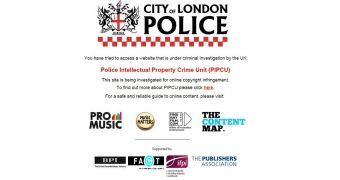MP3 search engine MP3Juices has been shut down following a request from the Police Intellectual Property Crime Unit (PIPCU) from the London Police.
This is yet another win for the City of London Police, which has been working to take down sites that host pirated content or provide links leading to such content. Domain registrars have been getting demands to suspend various sites for over a year now.
Some have fended off the requests since they weren’t backed by court orders, but others have complied with the demands.
The second step the City of London Police took was to send warning letters to site owners, asking them to go legal or to shut down. Some have already agreed to do it just to bypass the hassle a law suit would mean for them.
“You have tried to access a website that is under criminal investigation by the UK: Police Intellectual Property Crime Unit (PIPCU). This site is being investigated for online copyright infringement,” reads a banner on the MP3Juices.com site, as pointed out by TorrentFreak.
With over a million visitors per month, the site was quite popular, so a lot of people will be quite disappointed with this turn of events. MP3Juices.com was suspended by its registrar Internet.bs, which has also suspended the domains of several other sites up to this point.
Some registrars want court orders
Many site owners are now looking for safe registrars that won’t just bend at requests from law enforcement and copyright owners unless they are backed by a court order, which is how it should be done from a legal point of view.
EasyDNS is, for instance, one of the few domain registrars that have protested against PIPCU’s efforts to get them to suspend sites without the proper documentation. As you can imagine, PIPCU isn’t too happy with their attitude and has even sent a threatening letter, saying the company itself could be held liable for aiding and abetting a criminal operation.
Of course, this seems to be the direction many copyright owners are going – accusing search engines, cloud storage providers, domain registrars and everyone under the Sun for online piracy.
Instead, as companies such as Google have suggested over the years when it came to legislators taking into consideration measures against all of the above, they should rather look at offering people legal alternatives that are actually accessible price-wise.
As an example, Spotify has recently said that music piracy in Australia dropped 20 percent since they entered the market there, which is proof that people will choose legal alternatives if they don’t cost an arm and a leg.
[UPDATE:] The site makes a comeback.

 14 DAY TRIAL //
14 DAY TRIAL //